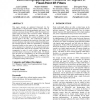Free Online Productivity Tools
i2Speak
i2Symbol
i2OCR
iTex2Img
iWeb2Print
iWeb2Shot
i2Type
iPdf2Split
iPdf2Merge
i2Bopomofo
i2Arabic
i2Style
i2Image
i2PDF
iLatex2Rtf
Sci2ools
DAC
2003
ACM
2003
ACM
Determining appropriate precisions for signals in fixed-point IIR filters
This paper presents an analytical framework for the implementation of digital infinite impulse response filters in fixed-point hardware on field programmable gate arrays. This analysis is necessary because FPGAs, unlike fixed register size digital signal processors, allow custom bit widths. Within the framework, the designer determines the number of bits necessary for representing the constant coefficients and the internal signals in the filter. The coefficient bit widths are determined by accounting for the sensitivity of the filter’s pole and zero locations with respect to the coefficient perturbations. The internal signal bit widths are determined by calculating theoretical bounds on the ranges of the signals, and on the errors introduced by truncation in the fixed-point hardware. The bounds tell how many bits are required at any point in the computation in order to avoid overflow and guarantee a prescribed degree of accuracy in the filter output. The bounds form the basis for a ...
Bit Widths | Computer Architecture | DAC 2003 | Field Programmable Gate Array | Infinite Impulse Response |
| Added | 05 Jul 2010 |
| Updated | 05 Jul 2010 |
| Type | Conference |
| Year | 2003 |
| Where | DAC |
| Authors | Joan Carletta, Robert J. Veillette, Frederick W. Krach, Zhengwei Fang |
Comments (0)

